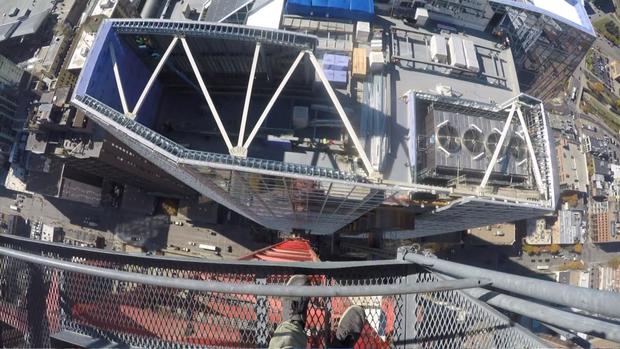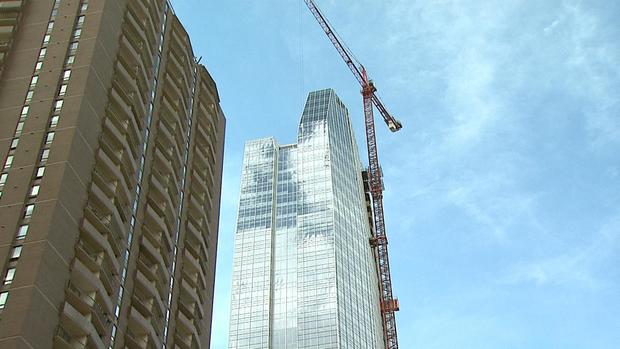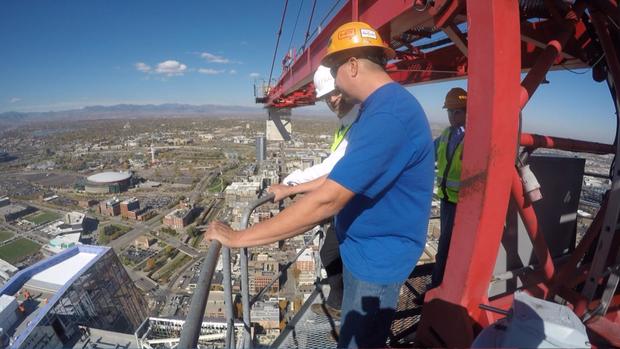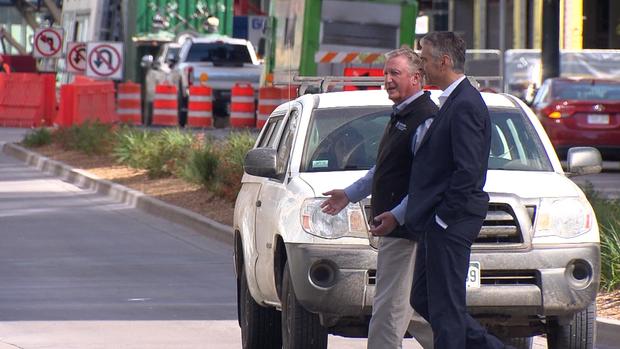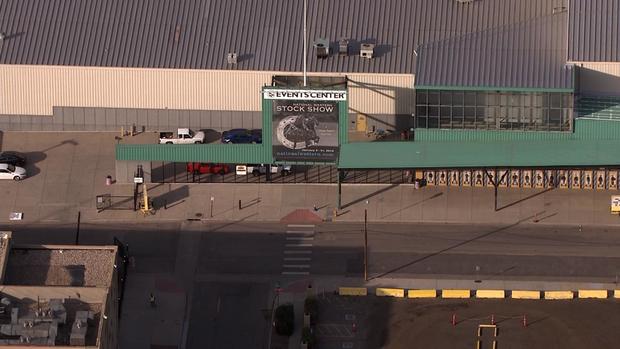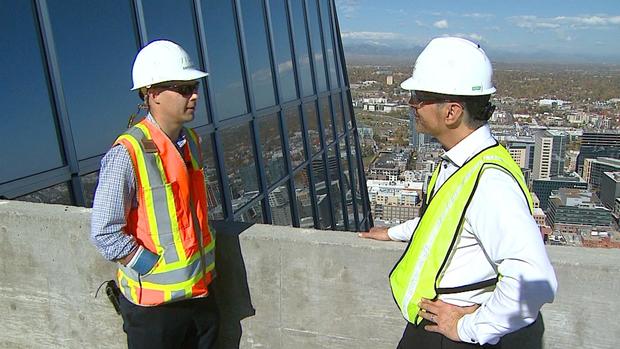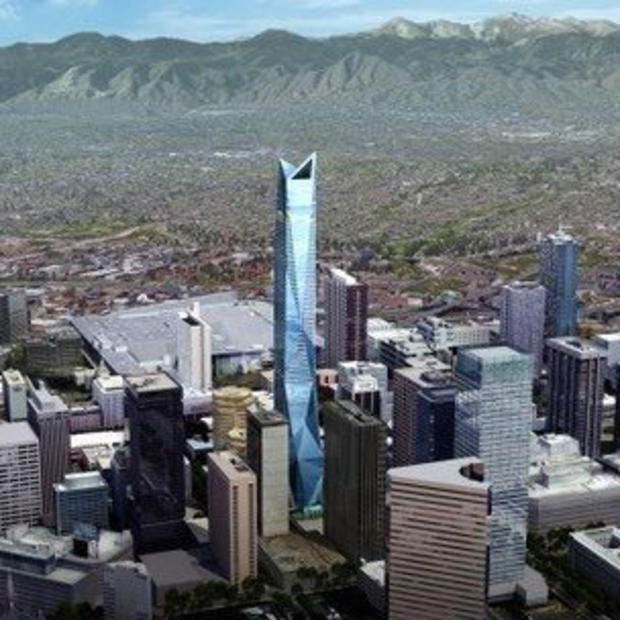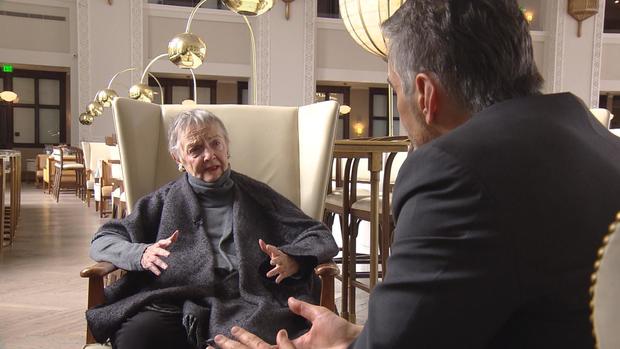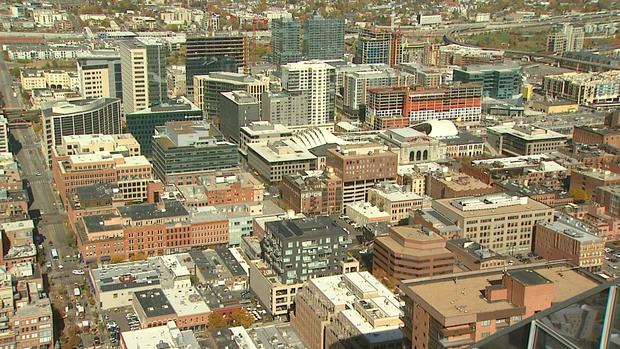Take A Sky-High Look Into The Mile High City's Future
By Alan Gionet
DENVER (CBS4) - The new skyscraper going up at 1144 15th Street in Denver is going to be 40 stories tall. When it's done, it will be the first time in 30 years that the city's skyline has gained altitude.
At the construction site, we rode a lift filled with workers heading up to add floors to 1144 15th Street.
"The hope is that this spurs some creativity in advancing architecture in the city," said Dave Klebba, a Denver native and VP of Construction for Texas based real estate developer Hines.
It has a unique look, with what they call a crown at the top and two outdoor patios. It will be Class A office space. Building it was a risk.
"So we hit the market, just right," explained Klebba about the building's stops and starts. "On this when we did it and it took us 20 years to figure that out."
Planning and building a building this big involves a bet on the market. Hines had plans for it in the mid-2000s, but backed off when the Great Recession hit in 2008. In 2014, as things geared up again they went for it.
A good chunk is already rented.
Denver is worth the risk, believes Hines.
"We've got to grow somewhere, we've got to house all these people moving in," said Klebba. "The question is can we economically balance cost of living versus the influx of people."
Nearly 2 million estimated to come to Colorado over the next 20 years. One million in the Denver metro area alone.
"We absolutely are supporting density in downtown," said Brad Buchanan.
He's the city's vision guy as executive director of Denver Community Planning and Development. More people means more cost effective mass transit, and generally there is greater safety in numbers.
"Our zoning and our zoning maps and where we've placed zone districts really try to focus on density and our growth around transit," said Buchanan.
That means the city expects growth around transit hubs.
"Transit stations -- like Union Station, like 38th and Blake -- that's the way you create an affordable human and humane place."
The corridor along Brighton Boulevard is poised for growth, particularly with plans for improvements at the National Western Stock Show property.
RiNo will grow. Land costs are lower than downtown and housing in great need. The north end of town is already getting a flurry of housing in RiNo and along Welton. Expect more.
And the Elitch's property, which at over 60 acres, will become too valuable to use only a few months a year.
"Obviously that's a huge opportunity site. Right next the core of downtown, right next to transit."
Buchanan would like to see Denver grow taller, but a formula on height may limit buildings.
"You could see a 75 or 80 story tower depending on the size of the site that was being designed for."
That formula is 20 to 1. Square footage can only be twenty times the land the building occupies. There are also sunlight ordinances near 16th Street. What happens, explains Klebba, is that as floor space declines while a building rises, that means less return on the higher cost of building less square footage. In addition, construction costs are rising due to land cost and the shortage of workers. That formula means in the immediate future, tall buildings may be held back.
"I don't know if we'd be building it today," Klebba said about 1144 15th.
Still, he's bullish.
"There are still several parking lots down here that you see," he pointed out from the crown of his company's new building. "Those will continue to be developed in the mixed use buildings and I also believe that there are still going to be a very large demand for single family residential."
Klebba sees development moving toward Wheat Ridge with demand for mixed use.
One other, more obscure aspect of growth is the presence of investment money. Real estate investment funds are loading up with cash and money managers are looking at growing cities to build. Denver is near the top of the list. Speculation may drive some building. But there are worries about when there might be a down cycle. Many see it coming. The city says the size of the projects they are seeing come in are backing off a little. A New York based developer Greenwich Partners floated the idea of a 1,000 foot tower in recent months, but the city has received no plans.
Is it good? We asked Dana Crawford, the pioneer of Denver's renaissance with the projects in Larimer Square and Union Station.
Some good, some bad she told us.
"I think that we should focus on the quality of design for sure."
She wants to keep links to the past and told us she's not fond of plans to sink Interstate 70 on the north side of Denver, preferring a broad boulevard and moving the highway north.
"We wish there were better ways to reach good design, but the dollar is the almighty thing."
She knows one change coming is autonomous cars. That, along with more mass transit, could mean less automobile traffic and more walking.
"We need to realize that we are historically in a transition point between a good many decades, probably six or seven decades that have been completely automobile-oriented, to the demise of a lot of projects."
Some day, she believes, some downtown streets might close as downtown becomes a walking city.
"We're already seeing ... developers who are building these new buildings are no longer building garages, parking garages with sloped decks in them," said Buchanan. "Most of them are building flat decks in anticipation of adaptively re-using that space for some use other that parking in the future."
They realize cars will be a big factor for years to come, but need to think about a future with far fewer.
"All US cities were designed for automobiles and to a great extent we're having to un-do some of those decisions," said Buchanan. "It's all about re-shaping our focus which we've had for years ... really formalizing our new focus on moving people, not cars."
Alan Gionet is anchor of CBS4 This Morning and reports on a wide variety of issues and "Good Question" stories. He started at CBS4 in 1994. Follow Alan on Twitter @AlanGTV or on Facebook.
